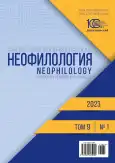Verbalization of corporality in blockade texts
- Authors: Efremov V.A.1, Popovich D.A.2
-
Affiliations:
- Herzen State Pedagogical University of Russia
- Umax LLC
- Issue: Vol 9, No 1 (2023)
- Pages: 31-42
- Section: RUSSIAN LANGUAGE. LANGUAGES OF PEOPLES OF RUSSIA
- URL: https://journal-vniispk.ru/2587-6953/article/view/295679
- DOI: https://doi.org/10.20310/2587-6953-2023-9-1-31-42
- ID: 295679
Cite item
Full Text
Abstract
Modern philology is increasingly turning to interdisciplinary problems, which include corporality, which is studied at the intersection of biology, medicine, cognitive science and philosophy. At the same time, the interest of linguistics in the conceptualization and verbalization of bodily and psychological individual experience leads to the need to study ego-documents that tell about the most difficult, traumatic life situations (hunger, war, disability, fatal illness, loss of loved ones, etc.). The purpose of the work is to explication of the specifics of the perception of the corporality of a resident of besieged Leningrad through the verbalization of one’s own and others’ bodily experience. The number of specific elements of the conceptualization of corporality (hunger, dystrophy, cold, trauma, etc.) were revealed. An analysis of the memories of the blockade survivors convincingly proves that the body was perceived by the starving inhabitants as deformed, destroyed and striving for inevitable death. Reflection on the body and corporality inevitably leads to the realization of the rigid connection of corporality with the psyche and morality. Such specific forms of comprehension and verbalization of the physicality of blockade runners as hunger trauma, winter trauma, and alienation of the body are identified and analyzed. The analysis of the traumatic bodily experience of the inhabitants of the besieged Leningrad can serve as a further development of linguistic studies of both corporality and traumatic experience.
Keywords
About the authors
V. A. Efremov
Herzen State Pedagogical University of Russia
Email: valef@mail.ru
ORCID iD: 0000-0002-0247-706X
Doctor of Philology, Associate Professor, Professor, Head of Russian Language Department
48 Moika Emb., St. Petersburg 191186, Russian FederationD. A. Popovich
Umax LLC
Author for correspondence.
Master of Pedagogical Education, Senior Lecturer
1 bldg 42 Bol’shoi Blvd., Moscow 121205, Russian FederationReferences
- Sobolev G.L., Khodyakov M.V. The confrontation between life and death: some results of studying the history of the siege of Leningrad. Noveishaya istoriya Rossii = Modern History of Russia, 2021, no. 2, pp. 294-323. (In Russ.) http://doi.org/10.21638/11701/spbu24.2021.201, https://elibrary.ru/xxqwgw
- Yarov S.V. Blokadnaya ehtika: predstavleniya o morali v Leningrade v 1941–1942 gg. [Siege Ethics: Ideas about Morality in Leningrad in 1941–1942]. St. Petersburg, European University Press at Saint-Petersburg, 2021, 590 p. (In Russ.) Available at: https://spirech.org/b/src/1649673681086-0.pdf
- Pavlovskaya A.Yu. «Ya znayu, chto tak pisat’ nel’zya»: Fenomen blokadnogo dnevnika [“I Know is Impossible Write like that”: The Phenomenon of the Siege Diary]. St. Petersburg, European University Press at Saint-Petersburg, 2022, 462 p. (In Russ.)
- Barskova P., Nikolozi R. Blokadnye narrativy [The Narrative of the Siege]. Moscow, Novoe literaturnoe oboz-renie Publ., 2017, 330 p. (In Russ.)
- Barskova P. Sed’maya shcheloch’: teksty i sud'by blokadnykh poehtov [The Seventh Alkali: Texts and Fates of Blockade Poets]. St. Petersburg, Ivan Limbakh Publishing House, 2020, 224 p. (In Russ.)
- Rudova Yu.V. Linguocultural features of body representation (exemplified by the Russian and English humor-ous discourse). Vestnik Severnogo (Arkticheskogo) federal’nogo universiteta. Seriya: Gumanitarnye i sotsia’nye nauki = Vestnik of Northern (Arctic) Federal University. Series: Humanitarian and Social Sciences, 2022, no. 1, pp. 90-99. (In Russ.) https://doi.org/10.37482/2687-1505-V158, https://elibrary.ru/gzaddr
- Voronina T. Review: Alexis Peri. The war within: diaries from the siege of Leningrad. Cambridge, Ma, Harvard University Press, 2017. Laboratorium: zhurnal sotsial’nykh issledovanii = Laboratorium: Russian Review of Social Research, 2017, no. 3, pp. 169-172. (In Russ.) https://elibrary.ru/ytxldb
- Simonenko V.B., Magaeva S.V. Fundamentals of survival in sieged Leningrad from the standpoint of sanogene-sis. Klinicheskaya meditsina = Clinical Medicine (Russian Jornal), 2014, no. 2, pp. 5-14. (In Russ.) https://elibrary.ru/rvmlet
- Kosenko L.V. Psychological effects of starvation on the example of the people who survived the siege of Lenin-grad. Zdorov’e – osnova chelovecheskogo potentsiala: problemy i puti ikh resheniya [Health is the Basis of Human Potential: Problems and Ways to Solve them], 2014, vol. 9, no. 2, pp. 522-523. (In Russ.) https://elibrary.ru/vqdjff
- Aierman R, Khlevnyuk D. Social theory and trauma. Sotsiologicheskoe obozrenie = Russian Sociological Re-view, 2013, vol. 12, no. 1, pp. 121-138. (In Russ.) https://elibrary.ru/qzvgmj
- Morina L.P. Kognitivnye aspekty telesnosti [Cognitive aspects of corporality]. Vestnik Sankt-Peterburgskogo universiteta. Seriya 6. Filosofiya. Kul’turologiya. Politologiya. Pravo. Mezhdunarodnye otnosheniya = Vestnik of Saint-Petersburg University. Series 6. Philosophy. Cultural Studies. Political Science. Law. International Relationships, 2013, no. 4, pp. 46-52. (In Russ.) https://elibrary.ru/ruwgsl
Supplementary files









